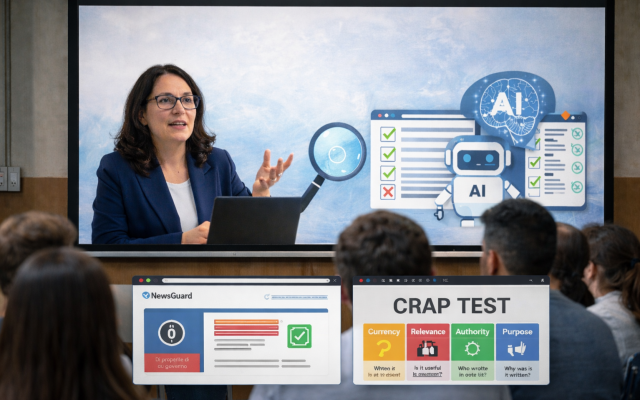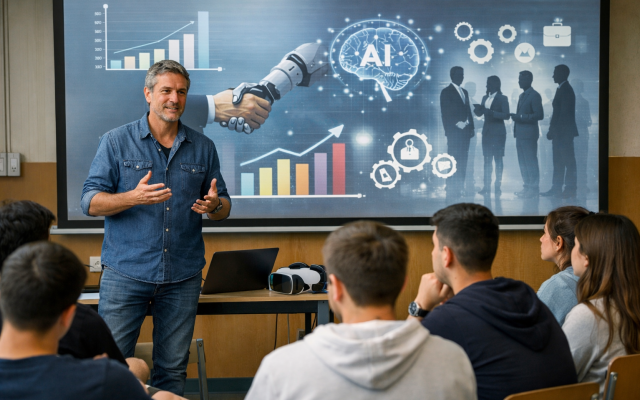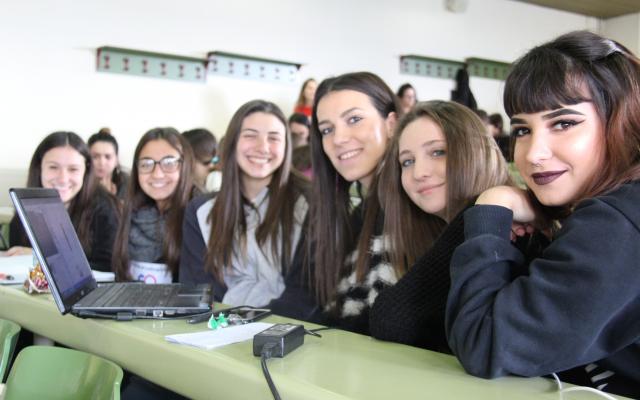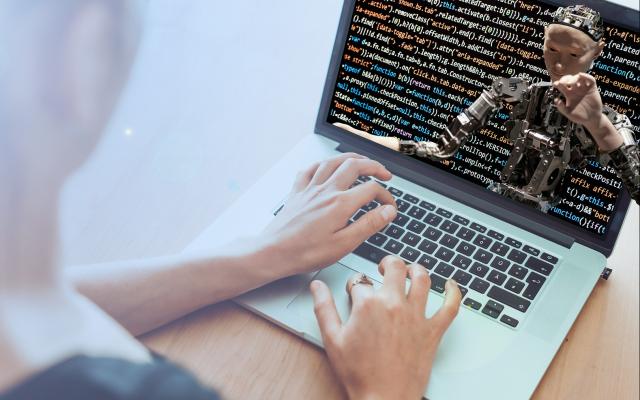A challenge for 100 students tomorrow. Here are the coaches.
Tomorrow, Friday, May 24, 100 students will participate in a challenge on ethical Generative AI at the Termoli facilities of the University of Molise (Department of Biosciences) with a hackathon on ChatSPOT: AI in Social Advertising, as part of Programme Coding Girls in synergy with Ital.IA Lab, promoted with Microsoft.
The students come from three upper secondary schools in Molise:
- A. Giordano - Venafro, Isernia
- Ettore Majorana - Termoli, Campobasso
- Boccardi-Tiberio - Termoli
The students prepared for the hackathon with seven coaches: master's and doctoral students from the University of Molise who will also support them tomorrow in the creation of interactive stories with GenAI applications through a critical, ethical, and responsible approach.
Today, we share their stories. They are Angelica, Antonio, Emanuela, Roberto, Valentina, Michele, and Francesco.
Angelica Spina, 23, bachelor’s degree in computer science from the University of Molise.
“I'm currently studying for a master’s degree in software systems security and I'm almost done. Thanks to my studies, I have discovered a dynamic and stimulating world, namely that of artificial intelligence, and I hope to be able to provide my contribution to its development, never losing sight of the security of our information!
The main reason that drove me to join the Coding Girls Programme as a coach was the idea that computer science education is a right of all young people, including girls. Being able to inspire and support girls to venture into the world of programming and artificial intelligence filled me with enthusiasm to participate in this experience. Seeing the girls grow passionate about the world of artificial intelligence and seeing them brilliantly pass all the tests that were given to them during the lessons filled me with pride and satisfaction. If I could improve something, I would suggest increasing the number of hours dedicated to the programme in order to delve deeper into the concepts and create more elaborate projects. Furthermore, it would be optimal to expand the network of schools involved, to reach a greater number of girls. Two students who particularly impressed me were Nicola and Marika. Nicola, despite having no previous experience in the field of artificial intelligence, proved to be extremely involved and committed, achieving excellent results thanks to his talent. Marika, on the other hand, stood out for her creativity, demonstrating great intuition and the ability to apply the notions to original and innovative projects. I highly recommend that all teachers and computer science enthusiasts participate in this programme. It’s a unique opportunity to make a difference and to build a more inclusive and technologically advanced future.”
Antonio Vitale, master’s degree in software systems security and first year PhD student in “Artificial Intelligence – Industry” at the Turin Polytechnic and University of Molise.
“My current interest is in the quality and impact of data used to train machine learning models. The motivation that led me to participate in the programme was the desire to spread the use of new technology to young people, making them aware of what awaits them and the new practices that will be on the agenda tomorrow. In fact, being a coach made me responsible for the information and notions shared with the students. I was particularly surprised by the willingness of some of them and the speed of adaptation to new technology. Furthermore, the collaboration with the teachers was positive and, when necessary, they supported the lessons in the best possible way.”
Emanuela Guglielmi, 27, master’s degree in software systems security and third year PhD students at the Department of Biosciences at the University of Molise.
“My research interests focus on automatic testing and recommendation systems applied to complex systems, such as video games and voice assistants. I decided to participate in the Coding Girls Programme because I consider it an interesting initiative to promote gender inclusion in STEM, inspiring and supporting young girls to pursue careers in coding and scientific subjects. Moreover, having studied Computer Science, I am pleased to introduce girls to this world by sharing my experience with them. I believe that the role of coach is important, as it allows us to contribute to the professional growth of young women and transmit our knowledge and skills to them. I am thrilled to see their progress and passion for technology grow throughout their education. This experience has rewarded me with their smiles as they interacted with tools that many of them had not been familiar with. What particularly left an impression on me were the moments of shared work. After overcoming the initial difficulties, they began to discuss the results they had achieved and that it was possible to have fun and collaborate. I wouldn't change anything in particular about this experience. However, based on the teachers' feedback, I would consider preparing some material to share with the students to help them consolidate what they have learned during the programme. Amongst the girls, I was particularly struck by a third year student, Melissa, who carefully completed the exercises, without omitting any details and even going beyond what was asked. Prof. Nicola was helpful, collaborative, and supportive in the interaction and discussion amongst the students.
Roberto Milanese, 24, PhD student.
“I expect to introduce students to the digital world, but also to get involved and – why not – learn something new from this experience. Participating in the Coding Girls Programme as a coach was an incredibly enriching experience. My main motivation was my passion for computer science, and the desire to inspire and encourage young people, especially girls, to explore the world of artificial intelligence. Since it is also the topic of my doctoral course, I found it stimulating to be able to share my knowledge and experiences with high school students. Being a coach allowed me to feel extremely fulfilled and motivated. It was an opportunity to grow professionally and personally. Seeing the enthusiasm and interest of the students was very rewarding and gave me great energy and motivation. If I had the chance to change anything about this initiative, I would improve the structure of the lessons to ensure a better balance between theory and practice, in order to make learning even more engaging and interactive. Amongst the students who impressed me, I would like to mention Angelica and Angelo. Angelica demonstrated great creativity in applying AI concepts to multimedia products, devising innovative and out-of-the-box solutions. Angelo, on the other hand, demonstrated tireless curiosity and impressive dedication. He asked great questions and showed considerable interest in the world of computing.”
Valentina Piantadosi
“During my studies, I developed the desire to share my cultural background with others, sharing my same passion with them. I want to provide my knowledge to everyone, so that they too can become passionate about the world of computer science and technology. My motivation to be a coach for the Coding Girls Programme was to train girls like me, in order to convey my same passion for IT and communicate to them that this world is suitable for them too. This experience provided me with wonderful sensations, because the girls were curious and wanted more and more information. Seeing the amazement in their eyes was the best thing in the world.”
Michele Guerra, 28, PhD student
“I was motivated to participate in the Coding Girls Programme as a coach because of my passion for technology and education. I have always believed in the power of coding as a tool for innovation and empowerment, especially for young women who often do not see enough role models in the tech industry. I wanted to do my part to close this gender gap and inspire the next generation of programmers.
Being a coach is an incredibly rewarding experience. It makes me feel useful and proud to see the students' progress and know that I have contributed to their learning journey. It's inspiring to see how their skills and confidence grow over time. The experience has provided me with the joy of having made a difference in the lives of the students. An episode that impressed me was when some students, who were initially very shy and insecure, confidently presented the tasks they had completed to the class. Seeing their transformation and their enthusiasm was one of the most significant moments of my experience as a coach. If I could change anything about this experience, it would be to include more resources and learning materials specifically geared towards problem-solving and critical thinking. I think this could further help students develop practical skills to prepare them for future challenges in the world of technology. I would also like to mention two students who particularly impressed me. The first is Anna, a young woman who showed incredible determination and creativity in her projects. Her passion for coding is evident and she demonstrated great curiosity and desire to learn. The second is Marco, who demonstrated excellent leadership and collaboration skills. He was a point of reference for his classmates and always offered his help generously.
The professor was extremely cooperative and very supportive. He facilitated a positive learning environment and always encouraged students to push themselves to their limits. His availability and enthusiasm made my job as a coach much easier and more pleasant.”
Francesco Salzano, PhD student, University of Molise
“The inequality in gender amongst STEM graduates is still clearly visible. Initiatives like Coding Girls can help bridge this gap. I have always found teaching and training enjoyable, especially when I can be sure that I have transmitted interest in a topic and raised curiosity about it. It was interesting to face this experience as I didn't imagine that the students already had a good knowledge of some of the tools. I found them to be very mature in dealing with the ethical aspects of generative artificial intelligence tools. In fact, the students proved to be aware of current issues that might affect them, such as gender and ethnic discrimination, geopolitical conditions, and the phenomenon of deepfakes. The group that I followed included both young men and women from different classes. However, it could be useful to work with more homogeneous groups that have a similar background level. In fact, the fifth-year students, having better programming foundations, asked decidedly technical questions on fundamental aspects that their younger peers knew nothing about. I avoided asking for names and personal information for privacy. In any case, one young man and one young woman particularly stood out, respectively for their technical and theoretical skills on the world of artificial intelligence and for the logic used in answering questions. Professor De Simone was collaborative, in the initial phase she gave me access to teaching tools (multimedia boar and PC); then, she not only followed the training activity, but also carried out the practical activities proposed.





